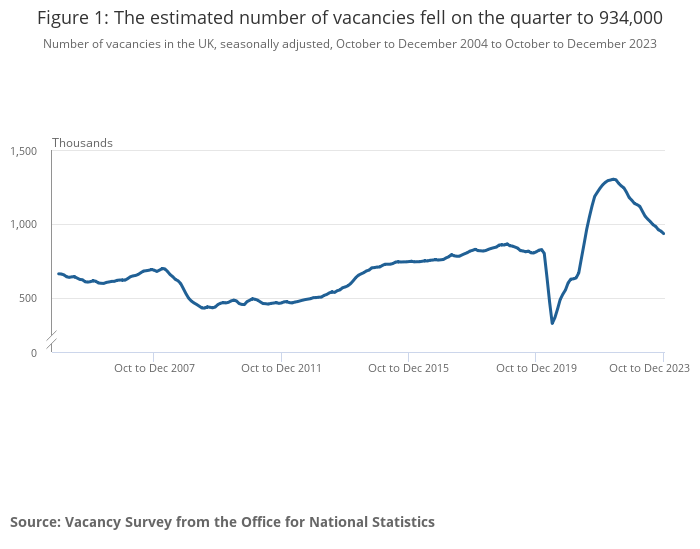Now that we are a couple of weeks into the new year and figures are in for the last quarter of 2023, it’s interesting to see that job vacancy numbers across the UK dropped for the 18th consecutive month.
Vacancy numbers fell on the quarter for a record 18th consecutive period in October to December 2023, down by 5.0% since July to September 2023 with vacancies falling in 12 of the 18 industry sectors. Total estimated vacancies were down by 226,000 from the level of a year ago, although they remained 133,000 above their pre-coronavirus (COVID-19) January to March 2020 levels.
The industry sectors showing the largest quarterly decreases in the number of vacancies were wholesale and retail trade; repair of motor vehicles and motorcycles, and transport and storage, which fell by 13,000 and 9,000, respectively. Arts, entertainment and recreation contracted the most, falling by 31.6%, followed by transport and storage, which fell by 23.7%.
The total estimated number of vacancies remains 133,000 above January to March 2020 pre-coronavirus (COVID-19) levels, with human health and social work activities showing the largest increase, at 34,000.
The chart below shows UK vacancy numbers and the sharp changes since the onset of the pandemic in March 2020.

So what is driving the reduction in job vacancy numbers that is showing in these numbers?
Commenting on the latest figures, Justine Andrew, Partner and Head of Education, Skills and Productivity at KPMG UK, said:
“It’s a muted end to the year for the labour market, which despite some loosening during 2023, continues to be tight. While the data for December shows hiring activity for both permanent and temporary roles fell at a softer rate than the previous month, businesses are still making redundancies and pausing hiring due to a lacklustre economic outlook. This has driven a further decline in permanent job opportunities, while we continue to see a rising number of people looking for new work.
“For those lucky enough to start a new role there was another sharp increase in starting salaries due to competition for skilled workers. But the rise wasn’t as high as those seen in recent months as businesses face ongoing pressure on their budgets. Recruiters tell us this pressure is now impacting temporary contracts, with fewer people employed on a short-term basis.
“Businesses which successfully planned and managed their workforce through the intense Christmas period will be breathing a sigh of relief and hoping 2024 brings some much needed certainty to boost the UK economy and overall productivity.”
Neil Carberry, REC Chief Executive, said:
“The slowdown in our labour market seems to be easing a bit. Given that December is a time when employers generally postpone activity into the new year, this is a positive sign that the labour market is weathering the current economic storm.
“Recruiters went into 2024 with hope that an upturn is coming, based on feedback from clients. Driving this economic growth would be a huge benefit for us all, leading to more successful firms, higher pay, and the ability to cut taxes and fund public services. But the growth must come first. The Chancellor has already set a date for the Budget – he should use it to set out steps that set firms free to grow the economy, from skills reform to regulatory change, including a more balanced debate on immigration for work and its impact on growth.
“Rising demand for healthcare staff emphasises again the importance of supporting NHS performance. Recruiters can see the impact on long NHS waiting lists in the supply of candidates looking for work – addressing this will be a key way to tackle inactivity. But the plan for NHS staffing needs to deal with 21st Century labour market realities. Medical staff have choices in and power over their careers – working with unions, agencies and other stakeholders on a plan will get the NHS farther than diktat from Whitehall.”
View from Plus One Recruitment
Whilst this news will not fill many with a great deal of confidence, there is positivity for an upturn in activity this year. If we can see further reductions in inflation, followed by an easing on taxation and interest rates, then there is every chance of a return to growth later in the year.
If you are an employer looking to recruit in 2024, or you are starting to look for a new job, then we would be more than happy to assist you.
Please reach out to us for an initial conversation by contacting us here.



